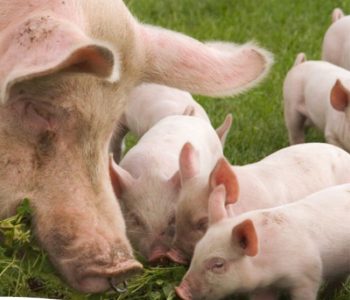The power of maternal imprinting on piglet performance
Weaning is a challenging phase for piglets. Nevertheless, one of the most critical phases in the life of good performing pigs starts much before, during gestation, until the neonatal phase, a period during which maternal imprinting is key. The early influence of the sow on their piglets, occurring even before piglets’ birth, can produce a profound and long-lasting impact on the offspring, that goes much beyond weaning. This includes the beneficial effects of balancing the digestive microbiota with probiotics.
What is maternal imprinting?
Maternal imprinting, also defined as maternal programming in the literature, refers to the process by which an acute or chronic stimulus, in utero, establishes a permanent response in the fetus that impacts physiologic function later in life (Estienne et al., 2008). Depending on the nature and timing of the stimulus, various physiological systems can be differentially affected. Different authors established link between the sow and piglets like: the sharing of intestinal microbiota, the transfer of immunity, growth performance and feed efficiency. We will focus here on the role of the microbiota.
Piglet gut microbiota development
Gastrointestinal tract microbiota is a major interface between the host and its environment and will positively or negatively impact growth and immunity of piglets. During early-life, intestinal microbiota colonization is essential for establishing a stable and healthy microecological structure and will play a strong and long lasting effect on animal health (Fig.1). Research in pigs has shown important links between the intestinal microbiota and performance and the ability to manipulate it for improvements in feed efficiency and average daily gain.
Figure 1: Importance of early intestinal microbiota establishment
Maternal microbial imprinting
The peripartum sow intestinal microbiota has a strong influence on piglet’s microbiota establishment and future performance:
- In early life:
In piglets, the colonization of the gastrointestinal tract occurs mainly within the immediate prenatal period and is driven by the mother through different and complementary ways of contamination: vagina, colostrum, milk, feces, and farrowing environment. Perturbations occurring during the early-life colonization may have long-term negative effects on piglet health. The diversification of the gastrointestinal microbiota occurs quite early in lactation where bacteria from the sow’s milk, the slatted floor and the nipple surface can be found.
- During lactation and beyond:
As lactation progresses, 7 days after birth, the influence of the microbial profile of the mother becomes stronger. During the first weeks of life, maternal milk is the main contributor of the microbiota in the small intestine, accounting for approximately 90%. It is also the main contributor in the large intestine although this declines rapidly with age and is partially replaced by microbial species present in the sow feces. With the introduction of solid feed and around weaning, the influence of the sow diminishes.
The earlier we can positively influence the sow’s and piglet’s microbiota, the stronger the effects on performance.
Probiotics in sows diet shape sow and piglet microbiota
Early establishment of microbiota is key for the development of the intestinal functions. During this short period, there are specific opportunities to influence the microbiota. For instance, interventions such as probiotics, represent a good opportunity to shape sows and piglet microbiota and in turn, influence their health and performance.
For instance, Le Floch et al., showed in 2022 that sows supplemented with Saccharomyces cerevisiae boulardii CNCM-I-1079 have a different microbiota profile than non-supplemented sows. Piglets from sows supplemented with the live yeast also have a different microbiota profile than piglets from control sows. By modulating sows’ microbiota profile, the probiotic yeast influences piglet microbiota profile (Figure 2).
Figure 2: Sows and piglets microbiota modulation when supplementing sows with S.c. boulardii CNCM I-1079 – Le Floc’h et al., 2022
Long lasting effects
The gastrointestinal microbiota has long-term implications in host physiology and health. The microbiota diversity can be used as a driver of performance for piglets. It means that bacteria in the gastrointestinal tract are correlated with piglet performance and drive this performance along the different physiological growth phases. For instance, it was observed that piglets at 56 days of age are performing better – with higher average daily gain – when they have a higher abundance of Lactobacillus at 4 days of age.
A study, conducted by Achard et al., in 2019, from 6 days to 20 days after weaning, showed that the microbial profile of the piglets born from Saccharomyces cerevisiae boulardii CNCM-I-1079 supplemented sows differ from the ones born from non-supplemented sows. Therefore, the effect of the live yeast on sow microbiota can be detected on their offspring’s microbiota even several days after weaning highlighting the long-lasting effect of maternal microbial imprinting (Figure 3).
Figure 3: Piglet microbiota modulation 20 days after weaning when supplementing sows with S.c. boulardii CNCM I-1079 – Achard et al., 2019
Improved performance
In the trial by Achard et al, growth performance of piglets born from probiotic-fed sows were also improved several weeks post-weaning (Figure 4).
Figure 4 – Influence of S.c. boulardii CNCM I-1079 supplementation to sows on the average daily gain of their piglets after weaning – Achard et al., 2019 *=pValue<0,05
The average daily gain of piglets born from the supplemented sows was significantly improved by 18% (p<0.05) in the two first weeks post-weaning and by 10% (p<0.05) overall the 35 days of post-weaning. Piglets born from the supplemented sows performed better even 35 days after weaning highlighting the long-lasting effect of sow supplementation on piglet performance.
CONCLUSIONS
The piglet’s microbiota establishment in the first weeks of life follow a programmed sequence in which the sow plays a major role. By positively affecting the gut microbiota from the sow to her piglets, probiotics, such as, Saccharomyces cerevisiae boulardii CNCM-I-1079, are interesting tools to support piglet quality and future performance. In a second part we will focus on the piglet immune system development and its interplay with the sow, another aspect of maternal imprinting.
References available upon request
